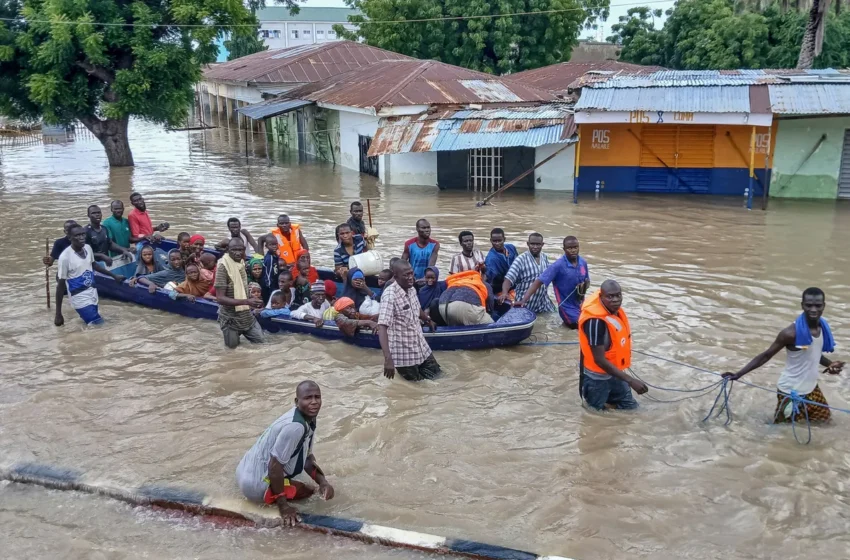Rising flood incidents in Nigeria: Causes, consequences and solutions

Ebonyi, Kano, Akwa Ibom… 14 Nigerian states at risk of flood this September: Audu Marte/AFP/Getty Images Photo Source: Bloomberg
By Ndidiamaka Ede
Rising flood incidents in Nigeria have become a critical issue, exacerbating the struggles faced by many citizens. The situation has reached alarming levels, prompting a need to examine the causes of flooding and the necessary precautionary measures that individuals and the government can take to mitigate its impact.
Current Situation
This year alone, flooding has resulted in the deaths of over 201 individuals and displaced approximately 225 people across 15 states, with Bauchi, Zamfara, Sokoto, Niger, and Jigawa being the most affected areas. According to the World Health Organization (WHO), flooding has impacted more than 600,000 people, destroyed infrastructure, increased food insecurity, and spread infectious diseases, with about 15 hectares of farmland devastated in a country already grappling with hunger.
The situation mirrors the catastrophic floods of 2022 when nearly all states were affected. UNICEF reported that those floods displaced around 1.3 million people and caused over 600 fatalities, while more than 200,000 homes were either partially or fully damaged; 60% of children were affected. In Borno, Adamawa, and Yobe states alone, there were 7,485 cases of cholera leading to 319 deaths.
The National Emergency Management Agency (NEMA) has warned that further damage is expected in September and October. While heavy rainfall is a significant factor in flooding, various human-induced activities also contribute to its severity.
Some Human-Induced Causes of Flooding are:
Urbanisation: Increased impervious surfaces like concrete prevent water from soaking into the ground, leading to heightened surface runoff and flash floods.
Deforestation: The removal of trees diminishes the land’s ability to absorb rainfall and increases runoff.
Poor Land Management: Leaving fields bare after harvest exacerbates runoff and contributes to flooding.
Infrastructural Development in Flood-Prone Areas: Construction in these areas disrupts natural water flow; understanding soil quality is crucial before building.
Pollution and Indiscriminate Waste Disposal: Dumping refuse in waterways blocks drainage systems, increasing runoff during rains.
Poor Dam Management: Ineffective management leads to sudden water releases during heavy rains, causing downstream flooding.
READ ALSO
No Rice and Ødegaard, no problem…. Arsenal beats Tottenham to keep pressure on City
CrispNG Youth of the Month: Meet Adeola, the 19-yr-old breaking barriers in politics
Impacts of Flooding
Flooding as has seen in the case of 2022 not only results in immediate physical dangers such as drowning and injuries but also leads to long-term health issues like infections from contaminated water and vector-borne diseases like malaria. Mental health problems including stress and PTSD can also arise from such traumatic experiences. Additionally, flooding incurs significant property damage, crop loss, and disruption of local economies.
To reduce vulnerability to flooding, individuals and the government have core roles to play. Individuals need to avoid activities that contribute to flooding such as poor land management. People also need to engage in community awareness programmes about flood risks and preparedness. As deforestation continues for development purposes, there is a need to participate in afforestation efforts to restore natural drainage capabilities.
On the part of the government, some measures to be taken include prioritising sustainable infrastructure development by constructing effective drainage systems and restoring wetlands. They should also implement policies regulating urban development in flood-prone areas. There is also a need to develop comprehensive flood management plans that include early warning systems and community engagement strategies.
There is a pressing need for Nigeria to integrate flood risk management with spatial planning. Historically focused on post-disaster responses rather than prevention, the government must adopt proactive measures to mitigate flooding risks effectively.
In conclusion, addressing the root causes of flooding through both individual actions and government initiatives is essential for reducing its impact on Nigerian communities. By investing in sustainable practices and infrastructure while fostering community resilience, Nigeria can work towards minimising the devastating effects of floods on its population.

